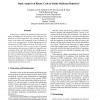Free Online Productivity Tools
i2Speak
i2Symbol
i2OCR
iTex2Img
iWeb2Print
iWeb2Shot
i2Type
iPdf2Split
iPdf2Merge
i2Bopomofo
i2Arabic
i2Style
i2Image
i2PDF
iLatex2Rtf
Sci2ools
140
click to vote
WETICE
1999
IEEE
1999
IEEE
Static Analysis of Binary Code to Isolate Malicious Behaviors
In this paper, we address the problem of static slicing on binary executables for the purposes of the malicious code detection in COTS components. By operating directly on binary code without any assumption on the availability of source code, our approach is realistic and appropriate for the analysis of COTS software products. To be able to reason on such low-level code, we need a suite of program transformations that aim to get a high level imperative representation of the code. The intention is to significantly improve the analysability while preserving the original semantics. Next, we apply slicing techniques to extract those code fragments that are critical from the security standpoint. Finally, these fragments are subjected to verification against behavioral specifications to statically decide whether they exhibit malicious behaviors or not.
Related Content
| Added | 04 Aug 2010 |
| Updated | 04 Aug 2010 |
| Type | Conference |
| Year | 1999 |
| Where | WETICE |
| Authors | J. Bergeron, Mourad Debbabi, M. M. Erhioui, Béchir Ktari |
Comments (0)

